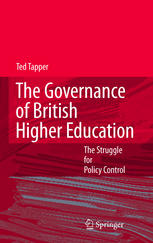

Most ebook files are in PDF format, so you can easily read them using various software such as Foxit Reader or directly on the Google Chrome browser.
Some ebook files are released by publishers in other formats such as .awz, .mobi, .epub, .fb2, etc. You may need to install specific software to read these formats on mobile/PC, such as Calibre.
Please read the tutorial at this link: https://ebookbell.com/faq
We offer FREE conversion to the popular formats you request; however, this may take some time. Therefore, right after payment, please email us, and we will try to provide the service as quickly as possible.
For some exceptional file formats or broken links (if any), please refrain from opening any disputes. Instead, email us first, and we will try to assist within a maximum of 6 hours.
EbookBell Team

0.0
0 reviewsHigher education in Britain has changed out of all recognition in recent years. We have moved from an elite to a mass system with more students, broader and more complex curricula, huge variations in what it means to be a student, and with institutions forging different relations to both the wider society and to the state. Indeed, it is no exaggeration to say that the very understanding of what is meant by higher education has little in common with how it was interpreted but twenty years ago.
The purpose of this book is to place these radical changes within the context of the governance of British higher education. How has the system of governance changed? Do British higher education institutions still exercise autonomous control over their development as was widely believed to be the case but a few years ago? These questions are pursued through a three-pronged strategy. Firstly, to examine the institutional changes which have occurred since the 1988 Education Reform and the emergence of the funding council model of governance. In particular, we want to know how the various institutional actors – the higher education institutions, the government departments and the funding councils – interact with one another to shape policy outcomes. Secondly, to explore the political context within which these institutional actors have to work. This means examining the role of the political parties, policy networks and the parliamentary forces all of which have a major stake in influencing the direction of higher education policy. This section of the book incorporates the move towards political devolution in the United Kingdom and examines what is different, and what is similar, about higher education policy-making in Scotland and Wales in comparison to England. Thirdly, the book observes the process of policy-making and change in relation to critical issues: the funding of higher education, the research assessment exercises, the quality assurance regime, and the widening participation agenda. In effect it examines policy-making in action.
The conclusion looks backwards and forwards. The main themes are highlighted and then two important questions are raised. How stable is the current model of governance? The answer to this question requires an analysis of the pressures for change and of the alternative models that could emerge in its place. The British system of higher education needs to be located within its European, even global, context. Is the system of governance capable of responding positively to the challenges that are likely to emerge given that higher education is now an international commodity?